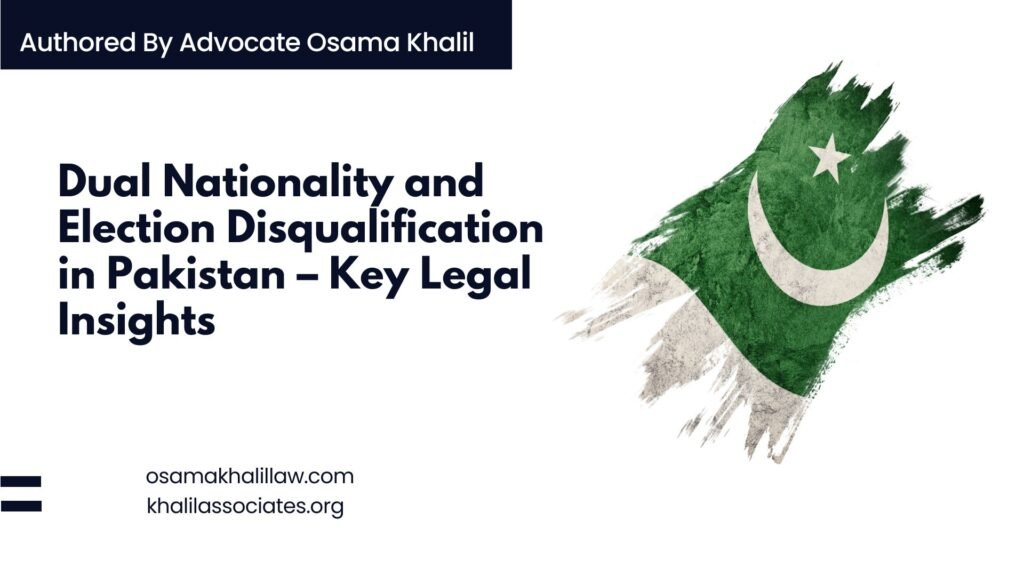
Recently, a significant court judgment clarified the rules for election candidates with dual nationality in Pakistan. The case involved Wajid Ur Rehman, whose nomination papers were rejected because he held British citizenship. This article breaks down the legal reasoning in simple terms, explaining why dual nationality disqualifies someone from contesting elections in Pakistan.
What Was the Case About?
Wajid Ur Rehman wanted to contest elections for the Punjab Provincial Assembly. However, the Returning Officer rejected his nomination papers because he held a UK passport. The officer cited Article 63(1)(c) of Pakistan’s Constitution, which bars foreign nationals from running for office.
Understanding Article 63(1)(c) – The Dual Nationality Rule
Article 63(1)(c) states that a person is disqualified from elections if they:
Cease to be a citizen of Pakistan, or
Acquire citizenship of a foreign country.
The key word here is “or”, meaning either condition alone is enough for disqualification. The court confirmed that holding dual nationality automatically makes a person ineligible, even if they haven’t lost Pakistani citizenship.
Why the Word “Or” Matters – Dual Nationality Pakistan
Wajid Ur Rehman argued that the word “or” should be read as “and”, meaning disqualification only applies if someone both loses Pakistani citizenship and gains foreign nationality. However, the court rejected this argument, stating that “or” is disjunctive—either condition triggers disqualification.
The Supreme Court had already settled this issue in a 2019 ruling, stating that dual nationals cannot hold parliamentary seats. This strict interpretation ensures that only those with undivided loyalty to Pakistan can participate in elections.
Did Applying to Renounce Foreign Citizenship Help?
Wajid Ur Rehman claimed he had started the process of renouncing his UK citizenship. However, the court ruled that merely applying isn’t enough—the renunciation must be complete before filing nomination papers. Since his application was still pending, he remained a British citizen at the time of scrutiny.
A 2013 case (Sayed Anwar Hasanat) had a similar outcome. The candidate had applied to renounce US citizenship, but since the process wasn’t finalized, he remained disqualified. The law requires candidates to fully resolve foreign citizenship issues before elections.
The Role of the Returning Officer
Returning Officers play a crucial role in ensuring fair elections. Their job is to strictly scrutinize nomination papers and disqualify ineligible candidates. The Supreme Court has emphasized that they must act as gatekeepers, preventing anyone violating constitutional rules from contesting.
In Nawabzada Iftikhar Ahmad Khan’s case (2010), the court highlighted that Returning Officers must uphold election integrity by enforcing eligibility criteria without bias. This ensures only qualified candidates enter the race.
Key Takeaways for Future Candidates
Dual Nationality = Disqualification – Holding foreign citizenship, even with Pakistani nationality, bars you from elections.
Renunciation Must Be Complete – Starting the process isn’t enough; foreign citizenship must be fully surrendered before filing papers.
No Legal Loopholes – Courts strictly interpret Article 63(1)(c), and past rulings leave no room for exceptions.
Why Does Pakistan Ban Dual Nationals from Elections?
The law aims to ensure that lawmakers have undivided loyalty to Pakistan. Since foreign citizens may have legal obligations to other countries, the Constitution prevents potential conflicts of interest. This rule maintains national sovereignty and trust in elected officials.
Can the Law Change in the Future?
While some argue that dual nationals bring global experience, the courts have consistently upheld the current rule. Any change would require a constitutional amendment, which seems unlikely soon. For now, candidates must fully comply with existing laws.
What Should Aspiring Candidates Do?
If you hold dual nationality and wish to contest elections:
Renounce foreign citizenship well in advance—don’t wait until nomination time.
Keep documented proof of completed renunciation to avoid last-minute rejections.
Consult legal experts to ensure full compliance with election laws.
Conclusion
The Wajid Ur Rehman case reaffirms Pakistan’s strict stance on dual nationality and elections. The courts have made it clear: foreign citizenship disqualifies candidates, no exceptions. Future aspirants must resolve their foreign status before filing nomination papers or face rejection. This rule strengthens election fairness and ensures leaders remain fully committed to Pakistan.
By understanding these laws, voters and candidates alike can better navigate Pakistan’s electoral system. Clarity on dual nationality rules helps maintain trust in the democratic process while upholding constitutional principles.
Legal Assistance
For professional legal guidance and support in immigration matters, you may contact:
Mr. Osama Khalil
Lawyer & Legal Consultant
📞 Phone: 0316-1829946
📧 Email: contact@osamakhalillaw.com | contact@khalilassociates.org
